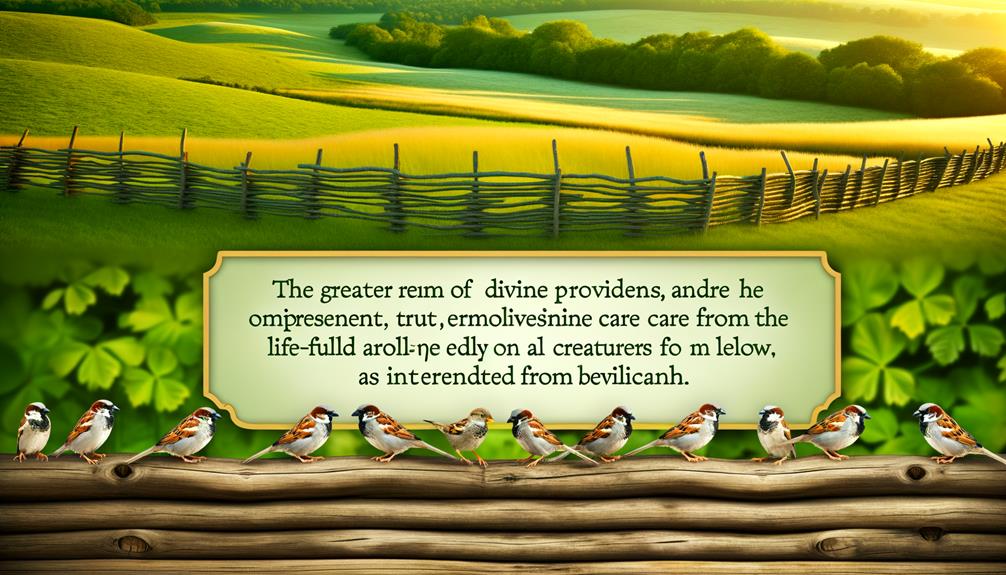Bible Verse Sparrows Find Food: A Comprehensive Guide
In the Bible, sparrows are often referenced to highlight themes of divine providence and care. Matthew 10:29-31 and Psalm 84:3 emphasize God’s meticulous attention to sparrows, symbolizing His care for all creation.
Sparrows illustrate the theological principle that God’s oversight guarantees even the smallest creatures are sustained within the natural order. This serves as an allegory for believers to trust in God’s provision for their own needs.
Observing how sparrows find food can deepen one’s understanding of trust in divine care, reflecting the interconnectedness and intentional provision within the ecosystem. To explore this further, consider the broader spiritual implications.

Key Takeaways
- Matthew 10:29 highlights that not one sparrow falls to the ground outside of God’s care, illustrating divine provision.
- Psalm 84:3 states that even the sparrow finds a home near God’s altar, signifying divine care and provision.
- Sparrows symbolize God’s intentional provision in creation, reflecting a balanced ecosystem meeting all creatures’ needs.
- God’s care for sparrows teaches believers to trust in divine provision for their own needs, fostering faith and peace.
- Observing sparrows finding food demonstrates daily reliance on God’s care, reinforcing spiritual principles of trust and divine oversight.
God’s Care for Sparrows: Biblical Lessons on Provision and Trust
| Aspect | Details |
|---|---|
| Key Bible Verse | Matthew 6:26 – “Look at the birds of the air; they do not sow or reap or store away in barns, and yet your heavenly Father feeds them.” |
| Symbolism of Sparrows | Sparrows represent God’s attention to even the smallest creatures, emphasizing His care and provision. |
| God’s Provision | The verse highlights how God provides food for sparrows without them needing to store or plan, symbolizing trust in God’s care. |
| Spiritual Lesson | The lesson is to trust in God for daily needs, just as sparrows rely on Him for sustenance. |
| Other Related Verses | Psalm 147:9 – “He provides food for the cattle and for the young ravens when they call.” |
| Human Connection | The sparrow’s reliance on God serves as a reminder for humans to depend on God for their own needs. |
| Sparrow in Biblical Context | Sparrows are used in scripture to convey messages about God’s love, care, and attention to all creation, even the smallest birds. |
Biblical Context of Sparrows

Throughout the Bible, sparrows are frequently mentioned to illustrate themes of divine providence, humility, and the value of life. In Matthew 10:29-31, Jesus emphasizes that not one sparrow falls to the ground outside the Father’s care, underscoring God’s meticulous attention to even the smallest creatures. This serves as a profound reminder of human worth in God’s eyes.
Additionally, Psalm 84:3 depicts sparrows finding a home near God’s altar, symbolizing humility and the accessibility of divine refuge. The modest sparrow, often perceived as insignificant, is elevated in biblical narrative to exemplify God’s encompassing care and the inherent dignity of all creation.
These references collectively underscore a theological perspective that values every aspect of life, regardless of its perceived significance.
Divine Provision in Nature
Building upon the biblical recognition of sparrows as symbols of divine care, the concept of divine provision in nature extends this idea to illustrate how all living beings are sustained through a harmonious and purposeful design.
This theological perspective posits that the natural world is a manifestation of divine wisdom, where every creature’s needs are met in alignment with a larger, interconnected system. From the smallest insect to the largest mammal, the ecosystem operates with an intrinsic balance, suggesting an underlying intelligence.
This intricate web of life supports the notion that there is an intentional provision embedded within creation, reflective of a benevolent Creator. Such a view encourages a deeper appreciation for the natural order and its sustaining mechanisms.
Symbolism of Sparrows

The sparrow, often seen as an unassuming and ubiquitous bird, has historically carried rich symbolic meanings across various cultures and religious texts. In Christianity, sparrows are emblematic of God’s care and provision, emphasizing that no detail is too small for divine attention.
In literature and folklore, they often symbolize simplicity and humility. The following key symbolic interpretations underscore their broad cultural significance:
- Divine Providence: In the Bible, sparrows signify God’s attentive care for all creation.
- Humility: Sparrows in literature often represent modesty and simplicity.
- Vulnerability: Their small size renders them symbols of fragility and defenselessness.
- Freedom: Sparrows are also seen as symbols of freedom, representing the soul’s liberation.
Such symbolism enriches our understanding of sparrows beyond their physical presence.
Lessons of Faith
The presence of sparrows in various ecosystems underscores a fundamental lesson in faith, particularly the trust in provision and assurance of divine care. Observing how these birds consistently find sustenance despite environmental challenges exemplifies a broader theological principle that faith in a higher power guarantees one’s needs will be met.
This natural behavior invites a deeper reflection on the human experience of relying on spiritual guarantees for daily sustenance.
Trust in Provision
Observing sparrows’ innate ability to find food offers profound insights into the principles of trust and provision, serving as a metaphor for lessons of faith.
This behavioral phenomenon underscores several key aspects of trust in divine provision:
- Innate Trust: Sparrows operate with an inherent belief in the availability of resources, mirroring a faith-based assurance.
- Daily Reliance: Their survival depends on daily sustenance, reflecting the necessity of continual trust.
- Adaptability: Sparrows adjust to varying environments, symbolizing the flexibility faith can offer in life’s uncertainties.
- Communal Support: Their flock behavior suggests a collective reliance, akin to the supportive nature of faith communities.
This analysis elucidates how observing nature can deepen our understanding of spiritual principles and trust.
Divine Care Assurance
In examining the concept of Divine Care Assurance, one can draw parallels between the consistent provision for sparrows and the faith-based belief in a higher power’s unwavering support. The biblical analogy of sparrows being fed without sowing or reaping underscores a divine promise of sustenance, a cornerstone of many religious faiths.
This assurance is not merely about physical nourishment but extends to emotional and spiritual well-being. By contemplating this, believers are encouraged to cultivate a deep-seated trust in divine providence. Such faith fosters resilience and tranquility, regardless of life’s uncertainties.
The sparrow becomes a symbol of divine care, reinforcing the tenet that faith in a higher power can offer profound peace and assurance in an unpredictable world.
Trust in God’s Care

Recognizing the providential care that sparrows receive can serve as a poignant reminder of the broader theological principle that divine oversight extends to all aspects of creation. This recognition encourages believers to trust in God’s care, grounded in scriptural assurances that He is attentive to even the smallest creatures.
- Scriptural Foundation: Biblical texts, such as Matthew 10:29-31, affirm that not a single sparrow falls without God’s notice, emphasizing His omniscience.
- Divine Provision: Just as God provides for sparrows, He promises to meet human needs, reinforcing the necessity of faith.
- Human Worth: Believers are assured of their value, as humans are deemed more important than sparrows.
- Faith and Peace: Trusting in God’s care fosters inner peace, reducing anxiety about life’s uncertainties.
Understanding these points deepens the spiritual conviction of divine care.
Modern Applications
Integrating the theological insights from the providential care of sparrows into contemporary living can provide practical guidance for maneuvering modern life’s complexities.
This biblical motif underscores the importance of trust and reliance on divine providence amidst the unpredictability of daily challenges. In a fast-paced, often anxiety-inducing society, the assurance of divine care can alleviate stress and foster resilience.
It encourages a paradigm shift towards simplicity and mindfulness, reminding individuals to focus on essential needs rather than excessive wants.
The intrinsic value found in this scriptural narrative can also inform ethical decision-making, promoting compassion and stewardship in personal and professional spheres.
Hence, the ancient wisdom encapsulated in the care of sparrows remains profoundly relevant and applicable today.
Personal Reflections

Reflecting on the sparrows’ instinctive ability to find sustenance, one is prompted to contemplate the broader implications for daily spiritual nourishment and trust in providence.
This natural behavior serves as a poignant metaphor for human reliance on faith and the unseen forces that guide our sustenance and well-being.
Daily Spiritual Nourishment
The concept of daily spiritual nourishment can be viewed as an essential practice for maintaining inner peace and personal resilience amidst life’s challenges. Engaging in spiritual activities regularly offers manifold benefits:
- Emotional Stability:
Frequent reflection and prayer can provide a sense of calm and grounding.
- Moral Compass:
Daily spiritual practices help reinforce ethical principles and moral decision-making.
- Community Connection:
Shared spiritual rituals can foster a sense of belonging and support.
- Purpose and Meaning:
Consistent spiritual engagement often helps individuals find deeper meaning in everyday experiences.
Trust in Providence
Understanding the concept of Trust in Providence necessitates a thorough examination of one’s faith in the unseen forces that govern and guide the universe.
Scriptural references to sparrows are often employed to illustrate divine care and meticulous provision, suggesting a broader theological principle. In Matthew 10:29-31, sparrows symbolize God’s omnipresent concern, reinforcing the notion that divine care extends to all facets of life, however insignificant they may appear.
This perspective invites believers to relinquish anxieties about material needs, fostering a spiritual resilience rooted in the assurance of divine oversight. Personal reflections on Trust in Providence therefore involve a conscious commitment to embrace faith over worry, recognizing that the same providence sustaining sparrows is equally operative in human affairs.
Strengthening Spiritual Beliefs
Exploring the ways in which sparrows find food can offer profound insights into the broader context of strengthening spiritual beliefs. Observing these humble creatures can elucidate key aspects of faith and reliance on divine providence.
The following principles emerge:
- Dependence: Sparrows rely on nature, symbolizing faith in a higher power.
- Persistence: Their relentless search for sustenance reflects the need for perseverance in spiritual pursuits.
- Adaptability: Sparrows adapt to varying conditions, mirroring the spiritual flexibility required to navigate life’s challenges.
- Communal Sharing: Often seen feeding in groups, they exemplify the spiritual value of community and mutual support.
Through these observations, one can derive a deeper understanding of how such natural behaviors can fortify one’s spiritual convictions.
Conclusion
The biblical depiction of sparrows underscores divine provision and care in nature, symbolizing broader theological themes of faith and trust.
By examining such narratives, one can discern a consistent message of God’s attentive care for all creation, reinforcing spiritual beliefs.
This analysis offers a profound understanding of how ancient texts convey enduring principles, encouraging a deeper, faith-based trust in divine sustenance.
Consequently, the symbolic sparrow serves as a compelling reminder of unwavering divine benevolence.






